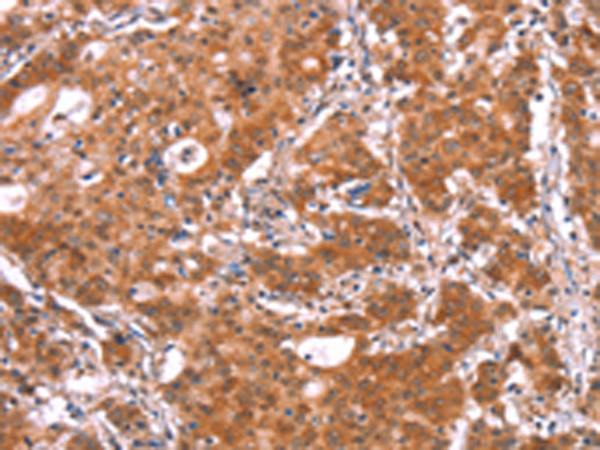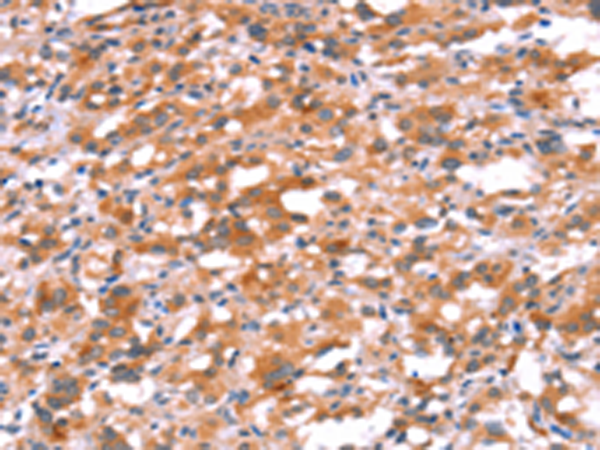


| WB | 咨询技术 | Human,Mouse,Rat |
| IF | 咨询技术 | Human,Mouse,Rat |
| IHC | 1/25-1/100 | Human,Mouse,Rat |
| ICC | 技术咨询 | Human,Mouse,Rat |
| FCM | 咨询技术 | Human,Mouse,Rat |
| Elisa | 1/1000-1/2000 | Human,Mouse,Rat |
| Aliases | CAS; CAS1; CASS1; CRKAS; P130Cas |
| WB Predicted band size | 93 kDa |
| Host/Isotype | Rabbit IgG |
| Antibody Type | Primary antibody |
| Storage | Store at 4°C short term. Aliquot and store at -20°C long term. Avoid freeze/thaw cycles. |
| Species Reactivity | Human, Mouse, Rat |
| Immunogen | Synthetic peptide of human BCAR1 |
| Formulation | Purified antibody in PBS with 0.05% sodium azide and 50% glycerol. |
+ +
以下是关于BCAR1抗体的3篇参考文献及其摘要内容:
---
1. **文献名称**:*BCAR1/p130Cas Signaling in Metastatic Breast Cancer Cells*
**作者**:Cabodi S. et al.
**摘要**:研究利用BCAR1特异性抗体,通过免疫沉淀和免疫印迹技术,揭示了BCAR1在乳腺癌细胞侵袭转移中的关键作用,证实其与整合素信号通路的相互作用促进细胞迁移。
---
2. **文献名称**:*Role of BCAR1 in Tamoxifen Resistance in Breast Cancer*
**作者**:van der Flier S. et al.
**摘要**:通过免疫组化(使用BCAR1单克隆抗体)分析临床样本,发现BCAR1高表达与乳腺癌患者对他莫昔芬耐药性显著相关,提示其可作为预后标志物。
---
3. **文献名称**:*BCAR1 Interaction with FAK in Cell Adhesion Signaling*
**作者**:Defilippi P. et al.
**摘要**:采用BCAR1多克隆抗体进行共聚焦显微术和免疫共沉淀实验,阐明了BCAR1与黏着斑激酶(FAK)的互作机制,及其在细胞黏附和存活中的调控功能。
---
如需扩展检索,可结合关键词“BCAR1 antibody applications”或“p130Cas detection”在PubMed等平台进一步筛选。
BCAR1 (Breast Cancer Anti-estrogen Resistance 1), also known as p130Cas, is a scaffold protein encoded by the BCAR1 gene. It belongs to the CAS (Crk-associated substrate) protein family and plays a critical role in cellular signaling pathways regulating cell adhesion, migration, proliferation, and survival. Structurally, BCAR1 contains multiple domains, including an SH3 domain and a substrate domain with tyrosine phosphorylation sites, enabling interactions with signaling molecules like Src kinases, Crk, and integrins. These interactions facilitate downstream activation of pathways such as MAPK/ERK and PI3K/AKT, influencing cytoskeletal reorganization and gene expression.
In cancer biology, BCAR1 is linked to tumor progression and therapy resistance. Overexpression of BCAR1 is associated with anti-estrogen resistance in breast cancer, often correlating with aggressive phenotypes and poor prognosis. It promotes epithelial-mesenchymal transition (EMT) and metastasis by enhancing cell motility and invasiveness. BCAR1 antibodies are essential tools for detecting its expression and phosphorylation status in research. They are widely used in techniques like Western blotting, immunohistochemistry, and immunofluorescence to study BCAR1’s role in cancer mechanisms, drug resistance, and potential therapeutic targeting. These antibodies also aid in exploring BCAR1’s interactions within signaling networks, offering insights into its clinical relevance as a biomarker or intervention target.
×